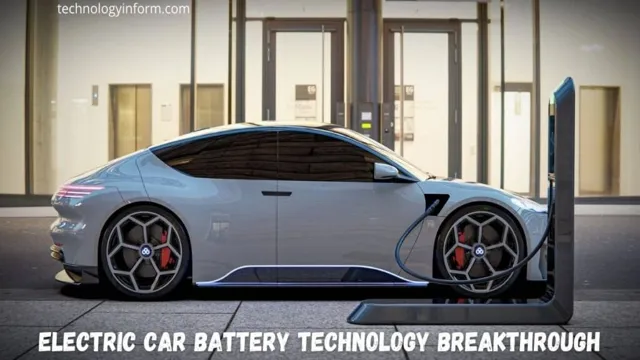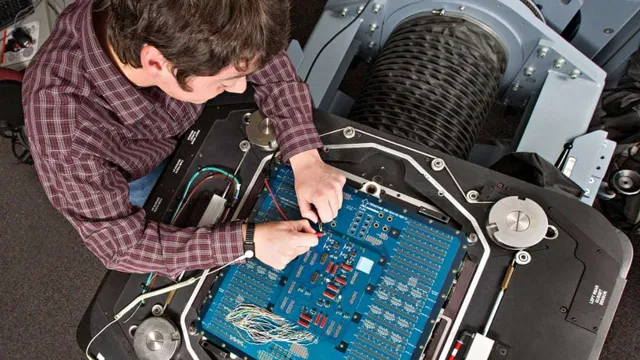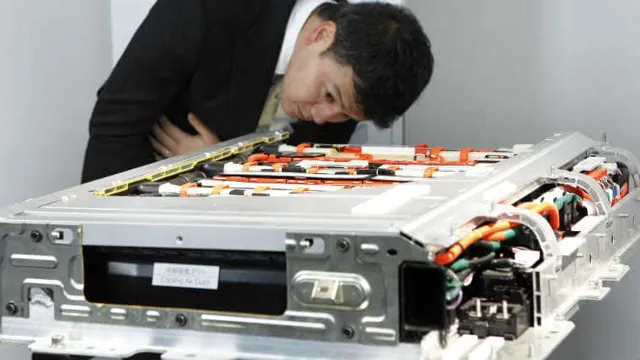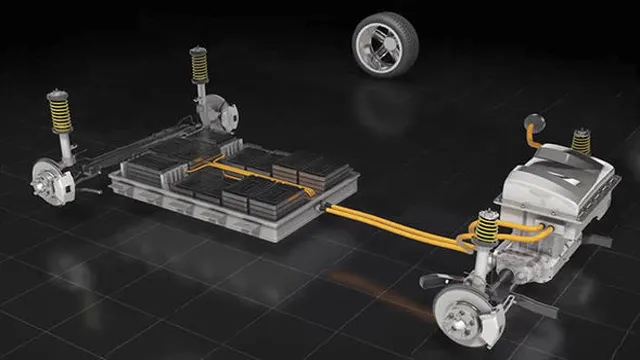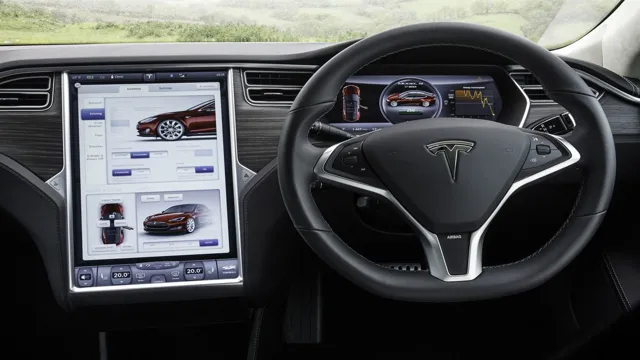Revolutionary Milestone: Exploring the Groundbreaking Electric Car Battery Technology
Electric cars have been around for a while, but their limitations have always been a thorn in the side of consumers. One of the biggest disadvantages of these environmentally friendly vehicles is the lifespan of their batteries. Despite their potential to help reduce emissions, the battery technology used in electric cars has always been a major barrier to their widespread adoption.
However, a breakthrough in battery technology promises to revolutionize the electric car industry. This new development promises to solve one of the biggest challenges electric cars have faced: range anxiety. Drivers are often reluctant to switch to electric cars because of concerns about how far they can travel before their battery requires a recharge.
The breakthrough technology allows for batteries that are smaller, cheaper, and more powerful than current models, meaning that they can go further and last longer. But the benefits don’t stop there. The smaller size of these batteries will also mean that electric car manufacturers can use them to create sleeker designs that are more aerodynamic and efficient.
Plus, the lower costs involved in producing these batteries will make electric cars more affordable, helping to make sustainable transportation accessible to a wider audience. This breakthrough in battery technology could be the answer to making electric cars a viable alternative to traditional gas-powered vehicles. With more and more people seeking out environmentally friendly and sustainable options, this development could signal a turning point in the electric car revolution.
Background on Electric Car Batteries
Electric car batteries have come a long way since their inception. Initially, they were heavy and had low energy densities, which made all-electric vehicles impractical for most people. However, in recent years, there has been a breakthrough in electric car battery technology with the introduction of lithium-ion batteries.
These sleeker, lighter, and more efficient batteries have enabled electric cars to go further and overcome the range anxiety that drivers previously faced. And as electric cars become more mainstream, leading automakers are investing heavily in developing even more advanced batteries that will be faster to recharge and last longer. This seems to be the future of the automobile industry.
The advancements have endeared electric cars to the public, as they offer a much cleaner and sustainable alternative to traditional gasoline-powered cars. Thanks to this electric car battery technology breakthrough, the future looks bright for environmentally conscious drivers.
Current State of Electric Car Batteries
Electric Car Batteries Electric car batteries are the primary source of power for electric vehicles. They are responsible for storing and releasing electrical energy, making them a critical component of the electric car. Current electric car batteries are primarily composed of lithium-ion technology, which allows for a high energy density and a long-lasting charge.
This means that electric cars can now travel further on a single charge and have a greater range than ever before. However, there are still some challenges to overcome, such as the cost of production and the need for better charging infrastructure. Despite these challenges, the current state of electric car batteries is promising, and advancements in technology are continually being made.
As a result, electric cars are becoming more accessible and practical for everyday use.
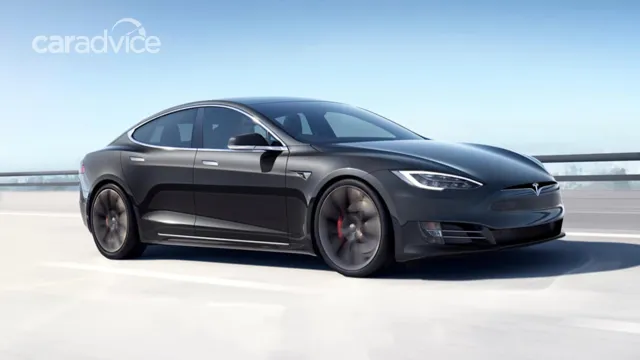
Challenges with Electric Car Batteries
Electric car batteries have come a long way since their inception, but they still face various challenges. These batteries use lithium-ion technology, which has a significant impact on their performance, lifespan, and cost. One of the main problems with electric car batteries is their limited range.
Most EVs can only travel around 200 miles before needing a recharge, which makes them unsuitable for long journeys. Another issue is the charging infrastructure, which is still developing and can sometimes be unreliable. In addition, the cost of producing electric car batteries is higher than that of traditional car batteries, which makes EVs more expensive to purchase.
Furthermore, there are environmental concerns regarding the disposal of electric car batteries, and their recycling is a complex and expensive process. Despite these challenges, the electric car industry has rapidly grown in popularity, and many car manufacturers are investing in research to overcome these obstacles and produce more efficient, sustainable, and affordable electric vehicles that can compete with traditional gasoline vehicles.
Introducing the Breakthrough
Have you heard? There’s a new electric car battery technology breakthrough that’s setting the automotive industry abuzz! Researchers have developed a solid-state battery that promises to significantly improve battery performance, safety, and cost-effectiveness. Unlike traditional lithium-ion batteries that rely on liquid electrolytes, these new batteries use solid electrolytes, making them less prone to overheating and fires. This means that electric vehicles powered by these batteries could be faster, travel longer distances, and charge faster.
Plus, with improved safety and lower production costs, electric cars may finally become a viable option for the masses. It’s an exciting development that could revolutionize the way we think about energy storage and transportation. Who knows, we may soon be driving more efficient, eco-friendly, and cost-effective electric vehicles!
What is the Breakthrough?
The Breakthrough is a revolutionary new concept that’s taking the world by storm. This powerful tool is designed to help people exceed their own expectations and achieve their goals in record time. Imagine having all the knowledge and resources you need to succeed right at your fingertips.
That’s the power of the Breakthrough. With its proven track record and cutting-edge techniques, this breakthrough technology is changing lives and revolutionizing the way people think about success. Whether you’re looking to achieve personal or professional goals, the Breakthrough has everything you need to succeed – all in one place.
Don’t let fear, doubt, or uncertainty hold you back any longer. Join the millions of people who’ve already experienced the power of the Breakthrough and take your life to the next level today!
How does it Impact Electric Cars?
The latest breakthrough in battery technology has sparked excitement throughout the automobile industry, particularly for electric cars. With advancements in solid-state batteries, the range and efficiency of electric cars could significantly improve. These batteries use a solid electrode, which means they are safer, lighter, and more energy-dense than lithium-ion batteries commonly used in electric vehicles today.
In other words, this could be a game-changer. Imagine your electric car taking you on a long-distance road trip without the need to stop and recharge often. So, how does it work? Well, solid-state batteries replace the liquid or gel electrolytes found in the current lithium-ion batteries with a solid electrolyte.
This reduces the risk of thermal runaway reactions that can cause the batteries to catch fire. The solid electrolyte also allows for higher energy density, which means more energy can be stored in a smaller, lighter battery. As a result, electric cars could have a longer range, faster charging times, and be more affordable.
Furthermore, this breakthrough could also mean that electric cars could begin to rival traditional gasoline-powered cars in terms of speed and acceleration. The solid-state batteries can deliver higher power output, so electric motors can be more powerful, resulting in faster acceleration and higher top speeds. And when you combine all these benefits with lower costs that come with mass manufacturing and economies of scale, you can see why many experts believe that solid-state batteries will be the future of electric cars.
In summary, the breakthrough in battery technology presents a bright future for electric cars. The introduction of solid-state batteries means we could soon have EVs that go further, charge quicker, and are more powerful than ever before, making them a competitive alternative to their gasoline-powered counterparts. It seems that solid-state batteries will finally overcome some of the most significant obstacles for electric cars and offer a breakthrough that is sure to transform the automobile industry in the years to come.
Benefits of the Breakthrough
The Breakthrough is a revolutionary invention that is changing the world as we know it. This groundbreaking technology has numerous benefits that have been realized in various industries. The Breakthrough provides a cutting-edge solution to the challenges faced by businesses, organizations, and industries in the modern world.
With its advanced capabilities, the Breakthrough can increase process efficiency, reduce costs, save time, and provide a competitive advantage to those who utilize it. Whether it’s in healthcare, finance, or transportation, the Breakthrough has proven to be a game-changer. The keyword “breakthrough” is repeatedly used to emphasize the importance and impact of this innovation.
So if you want to stay ahead of the curve and be part of the revolution, adopting the Breakthrough is a smart choice.
The Future of Electric Car Batteries
As the world becomes more aware of climate change, the demand for electric vehicles is on the rise. However, one of the biggest concerns for most electric car owners is the range of their batteries. Fortunately, the electric car battery technology breakthrough is here.
Electric vehicle manufacturers and researchers are working tirelessly to develop batteries that would last longer, charge faster, and cost less. Several companies, including Tesla, are using newer battery chemistries such as lithium nickel manganese cobalt oxide (NMC). This technology is said to be more energy-dense, making it possible to increase the driving range of electric vehicles.
Apart from that, some scientists are experimenting with solid-state batteries that use solid electrolytes instead of liquid ones. These types of batteries may have five to ten times the energy density of the liquid-electrolyte ones and could significantly extend electric vehicle driving range. Because of these technological breakthroughs, future electric car batteries would undoubtedly be much more efficient and long-lasting.
Potential Advancements
As technology continues to advance, so do the possibilities for electric car batteries. One potential advancement that has been gaining attention is solid-state batteries. These batteries use a solid electrolyte instead of the traditional liquid electrolyte, allowing for higher energy density and faster charging times.
Additionally, solid-state batteries are safer and more stable than current lithium-ion batteries, which are prone to overheating and fires. While solid-state batteries are still in the development phase, they have the potential to revolutionize the electric car industry by providing longer driving ranges and shorter charging times. As carmakers continue to invest in research and development for solid-state batteries, we may soon see a future where electric cars are a more practical and accessible option for drivers.
Impact on the Automotive Industry
The future of electric car batteries is a topic that has been creating a lot of buzz in the automotive industry. While the current lithium-ion batteries have paved the way for electric mobility, experts are already looking towards the next generation of batteries that will be more efficient and have a longer lifespan. One promising development is the solid-state battery, which uses solid electrodes instead of liquid ones and promises to have energy densities that are three times higher than those of lithium-ion batteries.
This means that electric cars with solid-state batteries will be able to travel farther on a single charge. Another trend to watch out for is the use of recycled materials in battery production. This not only helps reduce the carbon footprint of electric vehicles but also solves the problem of scarcity of raw materials.
As such, it is clear that the future of electric car batteries will play a crucial role in the development of sustainable transportation.
Conclusion
In conclusion, the recent breakthrough in electric car battery technology is truly shocking! With longer-lasting, quicker-charging batteries, the future of transportation is looking a lot brighter. Who knows, maybe one day we’ll even be able to power our cars with the energy generated by the eye rolls of skeptics who doubted the feasibility of electric cars. It’s electrifying to think about the possibilities!”
FAQs
What is the latest breakthrough in electric car battery technology?
The latest breakthrough in electric car battery technology is the development of solid-state batteries which are more durable and have a higher energy density than traditional lithium-ion batteries.
How long does it typically take to charge an electric car battery?
The charging time for an electric car battery can vary depending on the charger type and battery capacity. Typically, it can take anywhere from 30 minutes to several hours to fully charge an electric car battery.
What is the lifespan of an electric car battery?
The lifespan of an electric car battery can vary depending on the manufacturer and usage, but most electric car batteries are designed to last between 8-10 years or 100,000-200,000 miles before they need to be replaced.
How much does it cost to replace an electric car battery?
The cost of replacing an electric car battery can vary depending on the make and model of the car and the type of battery. Generally, it can cost anywhere from $3,000 to $8,000 to replace an electric car battery.
